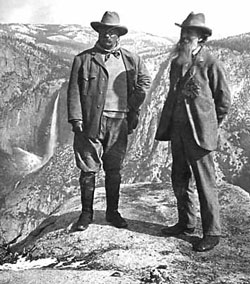By Emily T
Two very important ideas in the field of sustainability are
conservation and preservation. While these words may sound like the same thing
to most people, they actually have two different meanings. While both very
important and necessary, there has been much debate between conservationists
and preservationist, and how to find a balance between the two for the sake of
the environment.
Conservation has more to deal with using natural resources,
but at a sustainable rate.
The Dictionary.com definition of conservation is:
The careful utilization of natural resources in order to
prevent depletion.
A famous conservationist is Gifford Pinchot, the first chief
of the United States Forest Service from 1905-1910. Since then, the U.S. Forest
Service has been growing trees and protecting forests for the uses of
recreation, hunting, the lumber industry, and many more. Today, they protect
154 forests. Their goal is to maintain trees and forests, but still take
advantage of the resources they provide us at a sustainable rate. Conservation
covers more of what would be considered a practical use of natural resources,
focusing on the instrumental value of nature.
Preservation has to do with leaving the natural world
completely untouched by humans.
The Dictionary.com definitions of preservation are:
)to keep up; maintain
)to maintain or reserve
 An example of a preservationist is John Muir. Muir found a
spiritual connection to nature. He was one of America’s first
naturalists. In 1892 he formed the Sierra Club, which was a group that went on
to establish and promote America’s National Parks. The National Parks
Service is a solid example of preservation, because the entire goal of these
parks is to leave the areas as they always have been, as if they are untouched.
All wildlife and natural elements of the areas within these parks is entirely
protected. Activities like hiking are allowed, but activities like cutting down
trees, hunting, and anything destructive are strictly prohibited. Preservation
focuses more on the intrinsic value of nature, and protecting it because it deserves
to be protected.
An example of a preservationist is John Muir. Muir found a
spiritual connection to nature. He was one of America’s first
naturalists. In 1892 he formed the Sierra Club, which was a group that went on
to establish and promote America’s National Parks. The National Parks
Service is a solid example of preservation, because the entire goal of these
parks is to leave the areas as they always have been, as if they are untouched.
All wildlife and natural elements of the areas within these parks is entirely
protected. Activities like hiking are allowed, but activities like cutting down
trees, hunting, and anything destructive are strictly prohibited. Preservation
focuses more on the intrinsic value of nature, and protecting it because it deserves
to be protected. There has been much debate over how to sustain our
environment while still taking advantage of the resources that we need to
survive. This argument was often between conservationists and preservationists
throughout the 20th century. However, some will argue that conservation and
preservation are not as different as many think. President Theodore Roosevelt,
for example, was good friends with both Gifford Pinchot and John Muir (The
photo on the right is Teddy Roosevelt and Gifford Pinchot and the photo below
is Teddy Roosevelt and John Muir) . He promoted both the National Forest
Service and the National Parks system. He believed that preservation and conservation
were both very important ideas.
There has been much debate over how to sustain our
environment while still taking advantage of the resources that we need to
survive. This argument was often between conservationists and preservationists
throughout the 20th century. However, some will argue that conservation and
preservation are not as different as many think. President Theodore Roosevelt,
for example, was good friends with both Gifford Pinchot and John Muir (The
photo on the right is Teddy Roosevelt and Gifford Pinchot and the photo below
is Teddy Roosevelt and John Muir) . He promoted both the National Forest
Service and the National Parks system. He believed that preservation and conservation
were both very important ideas.
What do I think about this debate? While I tend to lean more toward the side of practicality, I truly understand both arguments, and I believe that balance is key. I am glad that we have organizations like the U.S. Forest Service, which protects natural resources that are used. I am also glad that we have the National Park Service, that protects beautiful places throughout the United States and preserves them in their natural state. Gifford Pinchot and John Muir were both very important men in the history of sustainability. Both conservation and preservation are important ideas to sustainability, and it is our responsibility as humans to apply these ideas to the natural world.
Works Cited
Dictionary.com. Dictionary.com, n.d. Web. 06 Mar. 2016.
"Grey Towers - Home." Grey Towers - Home.
N.p., n.d. Web. 06 Mar. 2016.
"Who Was John Muir?" About. N.p., n.d. Web.
06 Mar. 2016
Photos:
"Gifford Pinchot." Iz Quotes. N.p., n.d. Web.
06 Mar. 2016.
"Inspirational Quotes for Hikers - Dan's Hiking
Pages." Inspirational Quotes for Hikers - Dan's Hiking Pages. N.p.,
n.d. Web. 06 Mar. 2016.
"Who Was John Muir?" About. N.p., n.d. Web.
06 Mar. 2016.
Wikipedia. Wikimedia Foundation, n.d. Web. 06 Mar. 2016.

No comments:
Post a Comment